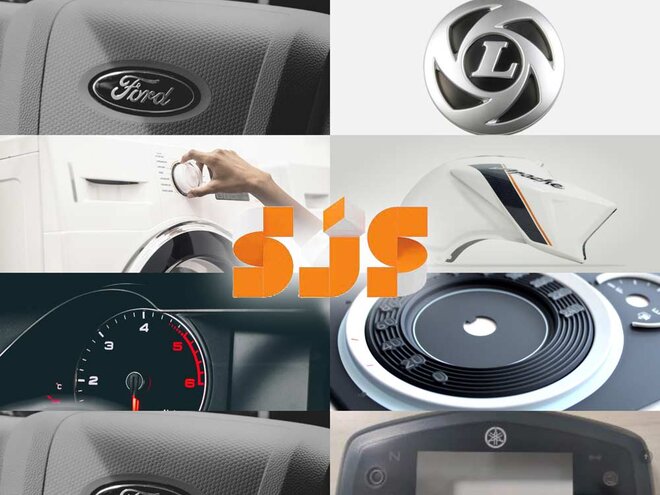
SJS Enterprises (SJS) is a manufacturer of decorative aesthetics. The company is promoted by K.A. Joseph (Managing Director) and Evergraph Holdings (private equity firm). The company's product offerings include automotive stickers (body graphics), logos (3D badges), parts for consumer appliances, instrument-related parts (appliques & dials), and other aesthetic parts including domes, in-mould label/decoration parts, etc. The automotive stickers segment contributed 36 per cent to the FY21 revenue, logos contributed 18 per cent, and consumer appliances parts contributed 16 per cent. SJS also offers a variety of accessories for the two-wheelers' and passenger vehicles' aftermarket under the brand "Transform." The company has also forayed into the chrome-plated, printed, and injected moulded plastic parts segment with its acquisition of Exotech (completed in April 2021). The company's products find application in the two-wheeler, passenger vehicle, commercial vehicle, consumer appliance, medical devices, farm equipment, and sanitary ware industries. SJS supplied over 115 million parts with more than 6,000 stock-keeping units in FY21 to around 170 customers across 20 countries. In FY21, the company derived 83.9 per cent of its revenue from India, while Europe (7.4 per cent), Asia (4.8 per cent), the USA (1.6 per cent), and other foreign countries (2.2 per cent) made up the rest. As of March 31, 2021, SJS offered the widest range of aesthetic products in India, according to CRISIL. The Indian aesthetic products industry generated Rs 1,990 crore revenue in FY21 (per CRISIL). It is expected that the industry will grow at a CAGR of approximately 20 per cent to reach Rs 4,920 crore by FY26. This growth will be led by the increasing use by consumers of premium, aesthetically superior, and technologically advanced products. The global aesthetic component industry is also expected to grow, driven by increasing premiumisation and a rise in the adoption of electric vehicles over the next five years. Strengths Long-standing customer relationships: As of June 30, 2021, the company's relationship with its ten largest customers (in terms of revenue) averaged approximately 15 years. This is attributable to SJS' collaborative design and product development approach and high product quality. The company typically enters into a customer relationship for a specific product. After demonstrating its quality, it pursues cross-selling opportunities and seeks to expand to other product lines and geographies with the customer. SJS' key customers operate primarily in the two-wheeler (58.0 per cent of FY21 standalone revenue), passenger vehicle (16.6 per cent), and consumer appliance (25.0 per cent) industries. Strong innovation and product design and development capabilities: SJS has a team of 44 personnel for the new product development (NPD) process, representing about 9 per cent of its total on-roll workforce. This team only works on the NPD process. This has allowed it to develop premium products and diversify its product range. As of Mar










